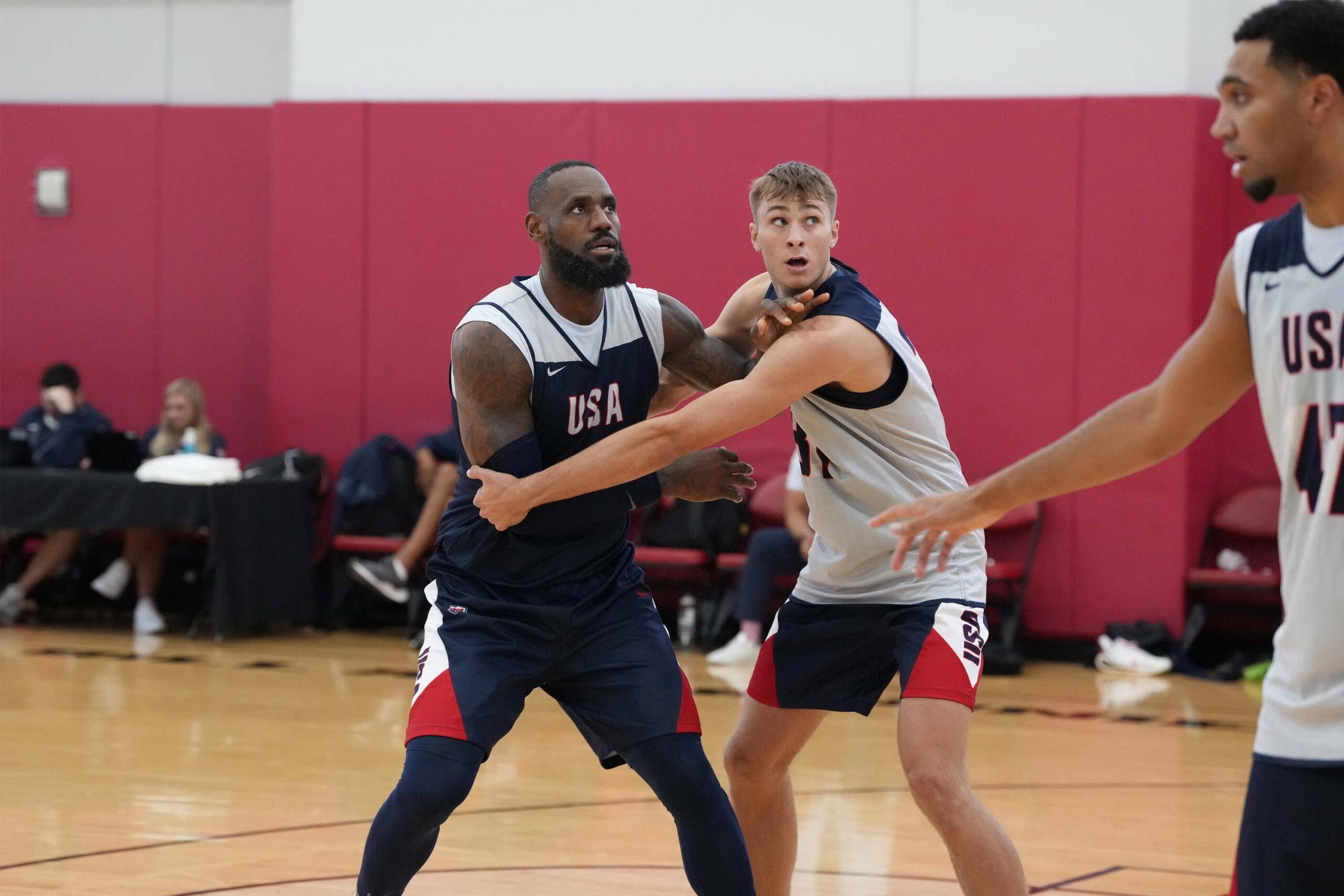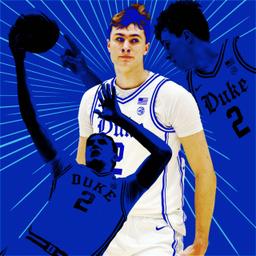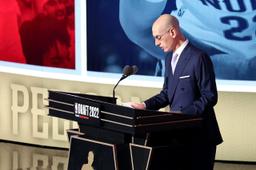The Maine, the Myth, and the Legend of Cooper Flagg
How did a rural town in an isolated corner of the country produce the consensus no. 1 pick in the NBA draft? “The place I grew up in taught me to work for everything, to value fundamentals, and to never back down,” Flagg says.It’s June 2, 2025, and most of the top NBA draft prospects are flying back and forth across the country, working out for teams in Miami, San Antonio, Los Angeles, or wherever else they were invited. But Cooper Flagg is home in Maine. Inside a quiet Division III gym at Colby College, the consensus no. 1 pick is running half-court drills with his twin brother, Ace, and a handful of ex-college players from around his home state.
No agents. No scouts. No assistant GMs in quarter zips. Just sneakers, hardwood, and sweat. A shirtless Flagg is working through a read-and-react drill as a six-second shot clock ticks down and his longtime development coach Matt MacKenzie barks instructions: “Hold the advantage! Counter! Move it!”
Flagg knows what’s coming. So does everyone around him. In a matter of weeks, his high-stakes career will launch under the brightest lights in professional basketball. Flagg is not just a lottery pick; he’s the lottery pick. One of the most hyped prospects of the decade and a potential savior for the Dallas Mavericks franchise, which desperately needs one.
But before the draft night fit, before the handshake photo with Adam Silver, before the summer league hype in Vegas and the ESPN microphones, the kid from Newport wants one more dose of home.
“Now that I’ve had a chance to experience other basketball cultures where resources are bigger and exposure comes easier, I’ve realized how much Maine shaped me,” Flagg tells The Ringer.
He was originally scheduled to spend the weeks leading up to Wednesday night’s draft in L.A., where he could have been running through CAA workouts with fellow lottery picks and grabbing dinners at Nobu. But Maine called to him.
“It was his idea to come back here,” says MacKenzie. “Coop says, ‘Matt, what do you think about maybe going back to Maine next week? I want to watch my old high school classmates graduate from Nokomis.’”
It would’ve been his graduation, too—if he hadn’t reclassified, skipped 11th grade, and fast-tracked to Duke at age 17.
MacKenzie pauses. “And I said, ‘Coop … this is about you.’”
So here they are in Waterville, a motley band of Maine hoopers. Flagg has spent these days working out, playing golf, and spending time with family. On the precipice of massive change, home is a grounding force. And summertime in Maine is a fleeting miracle—songbird mornings, lakes like glass, the smell of pine and sweetgrass.
That’s the thing about Flagg: To outsiders, it seems like a minor miracle that a rural town in an isolated corner of the country could produce the best American basketball prospect of the 2020s. But he can’t imagine it any other way. Flagg is a Mainer through and through—shaped by his home, the people who live there, and a proud basketball culture.
Newport sits about 200 miles up Interstate 95 from Boston—about three hours north. Beyond the famous state line sign that says, “Maine: The Way Life Should Be,” you pass Augusta and Bangor and roughly 20 million pine trees. You take Exit 157, and eventually, Sebasticook Lake emerges into view.
The Flagg family has lived here for generations. Their hometown wraps around the edge of this ancient glacial basin—a blue bowl left behind by the last ice age. The waterways here once powered wool mills and modest fortunes. But those days are gone. First, the jobs moved out of state. Then overseas. These days, many of Newport’s 3,200 residents—including some of Cooper’s relatives—commute more than 100 miles to Portland for work.
The lake is stunning. During summer, it teems with bass, and on the Fourth of July, the sun stays up until 8:30 p.m. In winter, it turns to ice and the light slips away by 4 p.m. During those months, basketball season unfolds across an endless string of frigid, black days—the exact kind that led James Naismith to nail a peach basket to a gym wall and invent a game to get restless New England kids through the winter.
“Because winter in Maine is so long, the basketball season gives a lot of Mainers something to look forward to and breaks up the monotony of the day-to-day,” says Kelly Bowman Flagg, Cooper’s mother.
Talk to anyone who knows anything about the origin story of Cooper Flagg, and they’ll all start with Kelly. She famously had the ’86 Celtics championship DVD running on repeat in the family van, but that’s just a small part of Cooper’s basketball education.
A generation before her son soared to the top of NBA draft boards, Kelly was rewriting expectations for what a hooper from Maine could be. Back in 1994, her coach at Newport’s Nokomis high school—where Cooper played his freshman year—captured her nature on the hardwood: “She’s a very well-rounded player who does everything well. She also has a tremendous desire to succeed and is very coachable. I wish I had a dozen Kelly Bowmans.”
After graduating, Kelly stayed close to home to play at the University of Maine. “She was proud to be from Maine and go to her home state university,” says Joanne P. McCallie, who coached the UMaine women’s team at the time. “She was loyal to the state.”
By her senior season, Kelly was the team captain, and on March 12, 1999, she helped the Black Bears to a historic upset over Stanford in the NCAA tournament. It was the program’s first win in the Big Dance. McCallie remembers Kelly as both a glue player and a tone-setter. “She was a great teammate,” McCallie tells me. “Vocal and willing to share her thoughts. Solid and strong post moves, too. Never afraid to take tough shots. She just did whatever was needed.
“She had an attitude of ‘We will win,’” McCallie adds. “Confident with a slight touch of cocky ... and never apologized. I loved that about her.”
It’s impossible not to hear parallels to the way coaches talk about Cooper. Ridiculously competitive. Coachable. Unafraid. Loyal. Kelly and her husband, Ralph, who played college ball at Eastern Maine Community College, instilled these qualities in their three boys. Hunter, the oldest, was born in 2004, and the twins, Ace and Cooper, arrived in 2006. All three grew up loving hoops.
In the Flagg household, watching basketball was a winter pastime. Kelly coached the Nokomis varsity girls team, and going to their games was a mandatory activity during the coldest months of the year. “Cooper was dragged out to watch our high school games at Nokomis before he could walk,” Kelly says.
Growing up, Cooper and his brothers trained together nonstop—driveway duels, late-night shoot-outs, every possession a battle. The competition was fierce. Ace pushed Cooper harder than anyone, getting under his skin, hustling for every rebound, and ultimately forcing Cooper to get better. When the twins were in sixth grade, Kelly took them to meet MacKenzie, who had just opened a small gym in Bangor, about 30 minutes from Newport. It was a kind of unmarked dojo for serious Maine hoopers, the kids who didn’t need Instagram drills or mixtape fodder, just reps.
MacKenzie looks like your quintessential Maine dad. Broad shouldered, bearded, and friendly, he could blend in just as easily on a hiking trail as he could in the frozen aisle at Hannaford—or on the sidelines training the best basketball prospect in the country. “From day one, they just locked in,” MacKenzie says of the Flagg twins. “You could see it. Especially with Coop. His intensity was unreal for his age. His attention to detail, his focus—it was like he already understood what this was going to take.”
Ace and Cooper worked. They listened. Then they went home and worked even more.
“You could tell right away they were applying what we did,” MacKenzie says. “Week to week, they’d come back, and you could actually see the growth. Most kids don’t show that. Most kids need reminders. These two didn’t. Coop especially—he just craved it. He wanted to be coached hard.”
The relationship evolved quickly—from one-off sessions to something deeper, a bond built on trust, honesty, and what MacKenzie calls “really tough love.” When Mackenzie had children himself, he asked Kelly and Ralph to be their godparents.
When the twins were in sixth through eighth grade, MacKenzie was Miyagi. And Cooper was quickly developing into a special player. He had sprouted to become one of the tallest kids in his age group, and his training sessions were building him up into a well-rounded player. MacKenzie knew that he had a special talent on his hands, but if you ask him when he realized that Cooper was on a rocket ship toward greatness, he doesn’t hesitate.
It’s not hard to pinpoint when the legend of Cooper Flagg first took off. It was fall 2021. COVID-19 rules. Mask mandate. The gym at South Portland High School was supposed to be at half capacity, the kind of sleepy preseason setting where you’d expect to see parents playing solitaire on their phones. But this was different. South Portland’s preseason game against a little-known team from up north turned into a standing-room-only event because word had gotten out that Flagg was playing.
Flagg was just a ninth grader, but in certain circles, he was already the most hyped Maine prospect ever. A 6-foot-8 prodigy with a twin brother, a sizzling highlight reel, and a real chance to play D-I—and maybe even pro ball. This was 14-year-old Cooper’s first high school game. And it seemed like the entire state of Maine had violated pandemic protocols just to see whether the myth was real.
South Portland had J.P. Estrella—a 6-foot-11 big who now plays for Rick Barnes at the University of Tennessee. Nokomis? It was from a lower division filled with rural schools. The boys’ team had never won a state title. Early on, the game was a back-and-forth slugfest. J.P. hit shots. Cooper answered. Then guys started fouling out. Flagg’s teammates were dropping like flies. And that was when the sequence happened: In overtime, a cramping Flagg had a chase-down block that looked like LeBron on Iguodala.
Then he threw down a baseline dunk on Estrella that sent the gym into absolute chaos.
You don’t get many “Wait, is this really happening?” moments in Maine high school basketball. This was one of them. Thirty-five points, 12 boards, and a double-overtime win against the eventual state champs. From a preseason freshman? Unreal. MacKenzie, watching from the bleachers, already knew what Flagg was capable of. But for the rest of the state, the lore had officially begun.
“I saw it coming.”
Andy Bedard is sitting in the conference room of his insurance office in Falmouth, Maine. He still looks like a player, with the build of a hooper and the same undeniable intensity that made him a basketball legend in these parts. A record-setting guard at Boston College and the University of Maine, Bedard is a Maine basketball Hall of Famer. His name still echoes in the state’s high school gyms. But by his 30s, he was focused on running his insurance business, raising his son, Kaden, and occasionally watching youth clinics around Portland from the sidelines. Then one afternoon, as a few well-meaning dads ran chaotic drills, he couldn’t take it anymore. “They were teaching iso moves before the kids could pivot,” he says. “Cart before the horse.”
That instinct—to start with the foundation—was what led him to reunite with an old college friend. Bedard knew Kelly from their University of Maine days. And as luck would have it, she and Cooper were getting ready to come to Bedard’s town for a tournament. He showed up to the gym, took a seat in the bleachers, and within minutes, was ready to jump back into the game.
“He was running the whole show,” Bedard says about Cooper, who was in fourth grade at the time. “Spacing, tempo, telling kids where to be.”
Soon, Bedard, Kaden, and the Flaggs began working together on a regular basis. Bedard didn’t want these kids tossed into the standard USA youth hoops blender—the fake-tough tournaments, highlight hunting, empty gyms, nobody playing help defense. “Trash AAU,” he calls it.
So he set out to build something better. Bedard started a new AAU squad, Maine United, in 2020. It was for Kaden, the Flagg twins, and other kids in the state who wanted to play disciplined basketball. “We weren’t trying to go viral,” Bedard says. “We were trying to get better. Real reads. Real spacing. Five playing as one. Compete. Sacrifice. Win.”
Like Flagg’s training with MacKenzie, it went beyond the sport. Summers were spent at Bedard’s house in New Gloucester, with the Flagg family parking their camper out back. Cooper, Ace, and Kaden trained, ate, and lived together. “Coop would crush a dozen chocolate chip muffins in my kitchen like he was part of the family,” Bedard says. “And eventually, he was.”
For high school, Kaden enrolled at Montverde Academy in Florida. After one year at Nokomis—in which they won the state title—Cooper followed. With Kelly and Ralph’s blessing, he and Ace moved in with the Bedards full-time. It was a dramatic migration—from rural Maine to arguably the most elite prep school in the country. It felt like a sitcom: a house full of Mainers and a teenager who was fast becoming the best basketball prospect in America.
By 16, Cooper had every opportunity to join a national AAU powerhouse—teams loaded with five-star recruits, flying coast to coast, stacked with shoe-company clout. But after a season at Montverde, he made a different call: He came back home, back to the program built by Bedard. “It meant something to him,” says MacKenzie, “to wear Maine across his chest—to show the rest of the country that talent could come from here, that he hadn’t forgotten who he was or where he came from.”
In the summer of 2023, Cooper led Maine United—coached by Bedard, Kelly, and MacKenzie—on an unprecedented run to the finals of Peach Jam, dragging a team of overlooked kids from a tiny state into the national spotlight.
Now 18, Flagg still gravitates toward home and to the people who molded him. “The place I grew up in taught me to work for everything, to value fundamentals, and to never back down just because someone thinks they come from a bigger program or place,” he says.
“There’s a purity to the game here. Everyone plays and watches for the love of it.”

There’s another moment that’s central to the lore of Cooper Flagg.
During summer 2024, before Flagg’s freshman season at Duke, Sean Ford, the head of USA Basketball’s men’s program, invited him to be part of the select team of rising American stars to scrimmage against the Olympic squad. Apart from Flagg, the select team roster mostly consisted of young NBA players like Amen Thompson, Brandon Miller, Payton Pritchard, and Trey Murphy III. The scrimmages gave the NBA world its first chance to see the kid from Maine play against elite NBA talent—it was like the South Portland game three years earlier, but instead of J.P. Estrella, Flagg was now playing against Anthony Davis.
Josh Longstaff is the top assistant coach for the Charlotte Hornets, but he’s also a Maine kid through and through. He grew up worshipping Bedard, played college ball at Bryant University, and takes pride in being one of only a few Mainers to make it in the association. “Everyone hears it growing up in Maine: ‘Well, you’re from Maine, you might not be able to play D-I basketball.’ We all dream about it, but it’s hard.”
Longstaff had accompanied the Hornets’ Brandon Miller to Vegas that summer, and he remembers one Flagg sequence in particular that made him and many other scouts true believers in his potential. It was the final day of camp. Flagg—still only 17 years old—wasn’t just playing like he belonged. He was playing better than almost anyone in the gym. He had been solid all week. Good in practice. Composed in the early scrimmages. Earning more and more trust from the coaches. But the last day was something different, and Flagg’s final scrimmage has become legendary for a reason.
The place I grew up in taught me to work for everything, to value fundamentals, and to never back down just because someone thinks they come from a bigger program or place. There’s a purity to the game here. Everyone plays and watches for the love of it.Cooper Flagg
The game was tight, and both teams were playing hard. After a late-game timeout, Flagg took the inbound pass in the backcourt and started to bring it up—and Jrue Holiday, one of the best defensive guards alive, was picking up the 6-foot-8 forward full court. Flagg brought the ball up with poise—“like a ’90s vet,” Longstaff says. Got it across half court. A high screen came, Davis switched onto him—endless arms, another All-World defender—but AD sagged just enough. Flagg saw it, and read it, just like MacKenzie had taught him.
Splash. A cold-blooded, unassisted 3.
And he wasn’t done. After a sloppy Tyrese Haliburton turnover on the other end, Flagg threw a perfect look-ahead pass for a wide-open 3-pointer. When the shot missed, what did Flagg do? He raced through traffic at full speed, rebounded the errant 3 over Bam Adebayo, and converted an acrobatic putback right before he fell forward onto the UNLV logo across the baseline.
Longstaff just shakes his head, a half smile creeping in. “When I was watching Cooper that day,” Longstaff tells me, “I could see that same mindset with him. The drive to show he belongs. He believes in himself, and nobody is going to outwork him.” Longstaff knows that Flagg is playing for more than just himself. “You could see that he wasn’t just fighting to show he belonged, but he’s fighting to give that community hope that they belong as well. … Just a kid from Maine.”
A year later, that kid from Maine is one of the most promising young prospects in the world for three main reasons: his measurables, his stats, and his age. His frame is perfect for the modern game: 6-foot-8 and 220 pounds. Long. Fluid movement. Statistically, his indicators are elite. The kid “filled the box score” as well as any player in college hoops. But what really separates Flagg as a prospect is his birthday.
After the Team USA camp, Flagg arrived at Duke at 17, the second-youngest player in all of college basketball. His decision to reclassify a few years ago meant that he arrived in college one year early; on December 21, 2024, he celebrated his 18th birthday by helping Duke to a 26-point victory at Georgia Tech.
In simple terms, he’s way ahead of schedule. Flagg will enter the NBA at virtually the exact same age LeBron James did, about two months shy of his 19th birthday. But James did not go to college. The fact that Flagg went to the Final Four and won Naismith College Player of the Year, the John R. Wooden Award, and the Oscar Robertson Trophy while he was the age of a typical high school senior is extraordinary. That’s not to say that Flagg is the next LeBron. It is to say that his pre-NBA résumé is as convincing as any we’ve seen in a very long time, maybe ever.
Let’s get nerdy. Advanced “one-number” metrics are always imperfect, but for historical purposes, box plus-minus (BPM) does a decent job of approximating the overall impact of college basketball players. It’s a dorky attempt to answer a deceptively simple question: How much better is your team when a certain individual player is on the floor?
Regardless of his age, Flagg’s BPM numbers from Duke are nuts. His plus-16.3 rating is fifth out of more than 7,000 qualifying college hoopers over the past 10 seasons. Even more unbelievable: Among the same set of more than 7,000 players, Flagg is also the youngest of the entire group.
Sports Reference has tracked BPM for college players since 2010. In that time frame, tens of thousands of freshman players have qualified for this BPM list, but only two have logged a better figure in the category than Flagg just did in his lone season in Durham, North Carolina.
Top Three Freshman Seasons Since 2010, According to BPM
Flagg is in elite company next to Zion Williamson and Anthony Davis. Both of those guys were among the greatest NBA prospects since James entered the league in 2003, but both of them turned 19 before their rookie seasons even started; Flagg will turn 19 on December 21.
What’s remarkable for a player so young is that Flagg’s offensive bag is already deep. Bedard proudly told me that Flagg could’ve led Nokomis to the state title even if he never took one shot. He’s a great playmaker. According to Synergy, which classified him as a “scoring ball handler,” Flagg grades as “excellent” in the pick-and-roll, in transition, and in post-up situations.
As a scorer, Flagg averaged 1.07 points per shot at Duke, which is a solid number fueled by above-average efficiency at the rim and strong jump shooting. But when NBA teams scout prospects, they don’t just look at aggregate stats for a whole season. Buried deep in Flagg’s college stats is a powerful finding: As he matured throughout the season, Flagg’s shooting numbers went from good to great.
This chart shows his shooting data after he turned 18, which coincidentally lined up with the beginning of ACC play, when games got tougher.

In the 11 college games Flagg played as a 17-year-old, he made 10 of his 41 3s. In the 26 games he played after his 18th birthday, he made 45 percent of his 94 3s and converted 87 percent of his free throws. By the end of the season, Duke owned the top-rated offense in the country, and Flagg led the team in both points and assists.
Then there’s the defense.
Last season, Duke ranked fifth among 364 teams in the country in defensive rating, according to KenPom metrics. Flagg can guard multiple positions, but scouts say that his feel for the game and competitiveness are the biggest keys to his defense. He led his squad in rebounds, steals, and blocks, not necessarily because he was the fastest or the strongest, but because he had learned to see the game two steps ahead. “We always said we had to help on defense,” Bedard tells me. “We weren’t the most athletic, but our angles were better. We were tougher.”
That toughness comes from Maine, from Kelly, from MacKenzie, and from Bedard. “Cooper has been surrounded by truth tellers,” Kelly says, and you can see it in his game, especially on the nonglamorous end of the floor. “If Cooper or his brother Ace walked into a workout with anything less than full effort, Matt didn’t let it go—he’d call them out,” she adds, “reminding them they were wasting people’s time and money.” If they played lazy defense for Maine United, there would be hell to pay, in the form of sprints.
Kelly believes that there are no “little things” in basketball—and no shortcuts to becoming a complete player. She found two coaches that shared her basketball values. Their families melded together as the kids grew up, and this one-of-a-kind support system molded Cooper.
“The gyms may be smaller,” Flagg says of the place where he grew up, “but the heart is massive.”
Now, the pride of Maine basketball takes that heart into the best basketball league in the world, into the pressure, and into whatever comes next.
“That foundation stays with you,” Flagg says, “no matter how far you go.”
Video embeds courtesy of Matt McCluskey.







